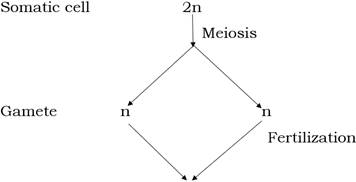Is the chromosome number of the zygote, embryonic cells, and adult of a particular organism always constant? How is the constancy maintained in these three stages?
Yes, the chromosome number of the zygote, embryonic cells, and adult of a particular organism is always constant because of mitosis/equational division and meiosis/reductional division.
This is done as follows gametes are formed by the meiosis during the process of gametogenesis. As a result chromosome gets reduced into half. When these gametes fuse, that is, at the time of fertilization, the number of chromosomes becomes equal to that in a somatic cell. After this, when cells multiply due to mitosis, the number of cells become consistent.

For example: In the case of humans, they contain 2n = 46 chromosomes in their somatic cell. Now when meiosis takes place, the number of chromosomes in gametes become n = 23. When fertilization takes place, the gametes fuse to form a zygote with ploidy n+n = 2n that is, 46 chromosome. Hence, maintaining the constancy in these three stages.